Global Medical Equipment Maintenance Market, By Equipment, By Service, By Service Provider, By Contract Type, By End-User, By Region & Segmental Insights Trends and Forecast, 2024 – 2034
- Industry: Healthcare
- Report ID: TNR-110-1180
- Number of Pages: 420
- Table/Charts : Yes
- June, 2024
- Base Year : 2024
- No. of Companies : 10+
- No. of Countries : 29
- Views : 10174
- Covid Impact Covered: Yes
- War Impact Covered: Yes
- Formats : PDF, Excel, PPT
Medical equipment maintenance involves the systematic inspection, servicing, and repair of medical devices to ensure they operate safely, accurately, and reliably. This process includes routine preventive maintenance, which aims to prevent equipment failures through regular checks and minor repairs, as well as corrective maintenance, which addresses any issues that arise. Effective maintenance ensures compliance with healthcare regulations, minimizes downtime, and extends the lifespan of the equipment. It encompasses a wide range of activities, from calibration and software updates to cleaning and parts replacement, all performed by trained technicians. Proper medical equipment maintenance is crucial for ensuring optimal performance, safeguarding patient safety, and maintaining the operational efficiency of healthcare facilities.
The demand for medical equipment maintenance is driven by the critical need for uninterrupted functionality and reliability of medical devices in healthcare settings. As hospitals and clinics increasingly rely on sophisticated technology for diagnostics, treatment, and patient care, ensuring these devices operate without fail becomes paramount. Regulatory requirements and accreditation standards mandate rigorous maintenance protocols to guarantee patient safety and compliance with health regulations. Additionally, the high cost of medical equipment and the financial implications of unexpected breakdowns propel healthcare providers to invest in comprehensive maintenance programs.
The integration of advanced technologies, such as predictive analytics and IoT, in maintenance practices further fuels demand, as these innovations enable proactive issue detection and resolution, thereby minimizing downtime and enhancing operational efficiency. Ultimately, the push for improved patient outcomes and efficient healthcare delivery drives the sustained need for robust medical equipment maintenance.
In terms of revenue, the global medical equipment maintenance market was worth US$ 32.5 Bn in 2023, anticipated to witness CAGR of 8.2% during 2024 – 2034.
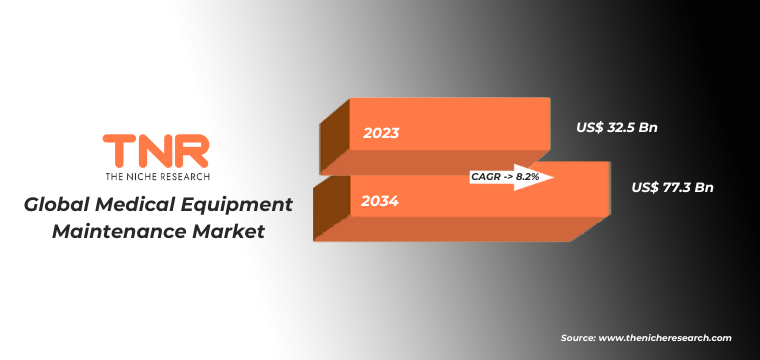
Trends in the Global Medical Equipment Maintenance Market
- Adoption of Predictive Maintenance Technologies Predictive maintenance uses advanced analytics and IoT-enabled devices to monitor equipment performance and predict potential failures before they occur. This proactive approach reduces downtime, prevents costly emergency repairs, and extends the lifespan of medical equipment. By leveraging big data and machine learning, healthcare providers can make informed decisions, ensuring continuous, efficient operations. The adoption of these technologies is growing as healthcare facilities seek to enhance equipment reliability and improve patient care.
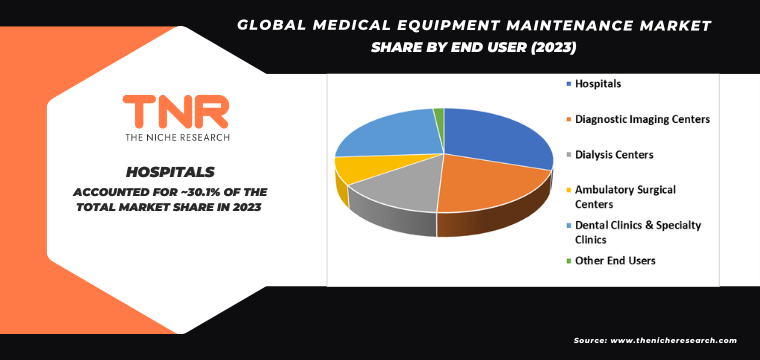
- Growth of In-House Maintenance Programs More healthcare institutions are establishing in-house maintenance teams to manage their equipment. This trend is driven by the desire for faster response times and cost control. In-house programs allow for immediate attention to equipment issues and regular preventive maintenance, ensuring equipment is always operational. Training staff and acquiring necessary tools and parts can be initially costly, but it provides long-term savings and greater control over maintenance schedules and standards.
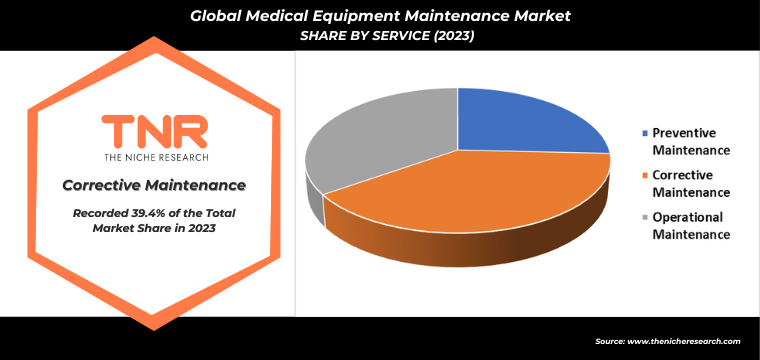
- Expansion of Service Offerings by OEMs Original Equipment Manufacturers (OEMs) are expanding their service offerings to include comprehensive maintenance packages. These packages often come with guarantees of high-quality service, use of genuine parts, and specialized expertise in the equipment. OEMs can offer tailored maintenance plans that align with the latest technology updates and regulatory requirements, giving healthcare providers confidence in the reliability and performance of their medical devices. This trend is growing as healthcare facilities seek trusted partners for their critical maintenance needs.
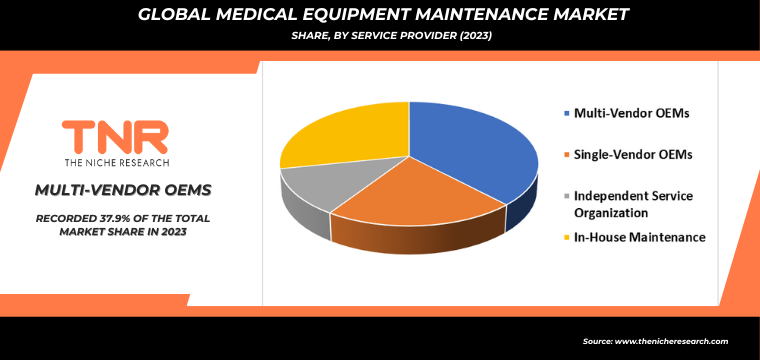
Surgical Instrument Segment is Projected as the Fastest Growing Segment in the Global Medical Equipment Maintenance Market During the Forecasted Period.
The growing emphasis on precision and reliability in surgical procedures is a major driver for the demand for meticulous maintenance of surgical instruments and medical equipment. In operating rooms, where every second counts, the performance of surgical tools can significantly impact patient outcomes and surgical success rates. Healthcare facilities are increasingly investing in robust maintenance programs to ensure these instruments are always in optimal condition.
Regular maintenance not only extends the lifespan of surgical tools but also ensures compliance with stringent health and safety standards, reducing the risk of infections and surgical complications. Advanced maintenance services, which include sterilization, calibration, and timely repairs, are critical in preventing unexpected equipment failures. As the healthcare sector continues to advance with more complex and technologically sophisticated surgical instruments, the necessity for reliable maintenance programs becomes even more pronounced, driving sustained demand in this vital aspect of medical equipment management.
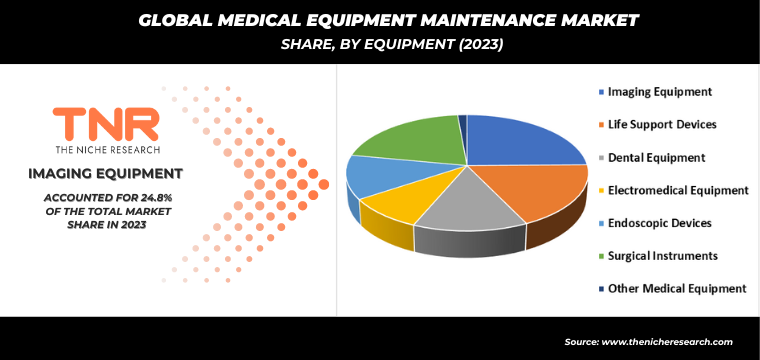
By Contract Type Premium Contract Segment had The Highest Share in the Global Medical Equipment Maintenance Market in 2023.
The demand for premium contracts in medical equipment maintenance is significantly driven by the need for uninterrupted, high-quality patient care in healthcare facilities. Hospitals and clinics are increasingly recognizing the value of ensuring that their medical devices, from MRI machines to ventilators, operate without fail. This reliability is crucial not only for patient outcomes but also for operational efficiency and compliance with stringent healthcare regulations. Premium maintenance contracts offer comprehensive services, including regular inspections, prompt repairs, and access to the latest software updates, minimizing the risk of equipment downtime.
Furthermore, the integration of advanced diagnostic tools and predictive maintenance technologies within these contracts helps in early detection of potential issues, thereby reducing emergency repair costs and extending the lifespan of the equipment. As healthcare providers continue to prioritize patient safety and operational excellence, the demand for premium maintenance contracts is set to rise, making them an essential investment for the modern healthcare industry.
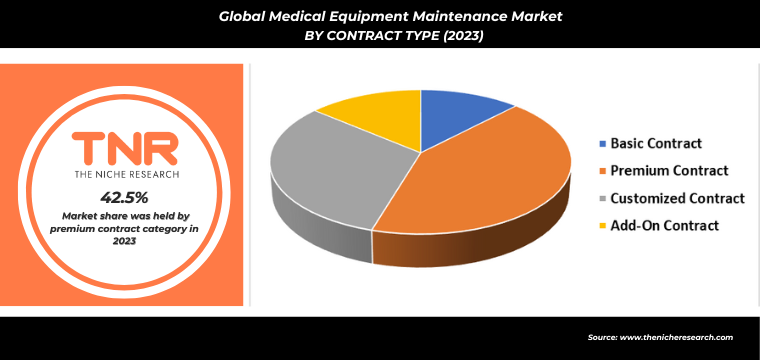
By Region, North America Dominated the Global Medical Equipment Maintenance Market in 2023.
The aging population is one of the most significant drivers for medical equipment maintenance market, as it increases the need for healthcare services and, consequently, medical equipment. Advanced medical technologies are being integrated into healthcare facilities, necessitating regular maintenance to ensure optimal performance and patient safety. Additionally, stringent regulatory requirements mandate routine checks and servicing of medical devices to comply with safety standards. The COVID-19 pandemic further underscored the importance of well-maintained medical equipment, as healthcare systems faced unprecedented pressure.
Hospitals and clinics are investing heavily in maintenance contracts to minimize downtime and extend the lifespan of expensive medical devices. Technological advancements in medical equipment also mean that specialized skills are required for maintenance, driving demand for trained professionals in this sector. Overall, these factors collectively fuel the growing demand for medical equipment maintenance services across North America. The U.S. dominates the North American market, with healthcare facilities investing heavily in maintenance contracts to comply with stringent regulatory requirements set by organizations such as the FDA and the Joint Commission.
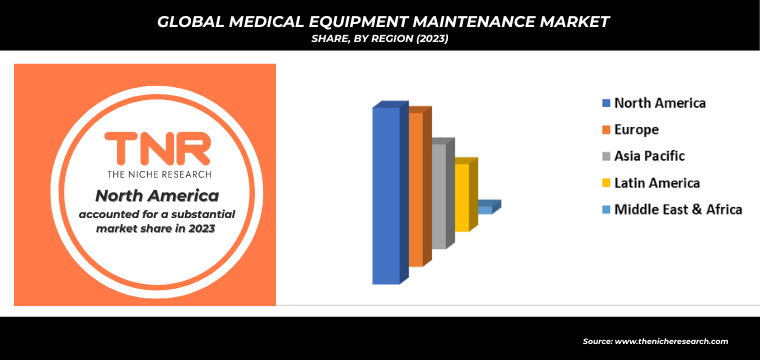
Competitive Landscape
Some of the players operating in the medical equipment maintenance market are
- Alliance Medical Group
- Althea Group
- Aramark
- Braun Melsungen AG
- BC Technical, Inc.
- Drägerwerk AG & Co. KGaA
- GE Healthcare
- Koninklijke Philips N.V.
- Medtronic
- Siemens Healthineers
- Other Industry Participants
Global Medical Equipment Maintenance Market Scope
| Report Specifications | Details |
| Market Revenue in 2023 | US$ 32.5 Bn |
| Market Size Forecast by 2034 | US$ 77.3 Bn |
| Growth Rate (CAGR) | 8.2% |
| Historic Data | 2016 – 2022 |
| Base Year for Estimation | 2023 |
| Forecast Period | 2024 – 2034 |
| Report Inclusions | Market Size & Estimates, Market Dynamics, Competitive Scenario, Trends, Growth Factors, Market Determinants, Key Investment Segmentation, Product/Service/Solutions Benchmarking |
| Segments Covered | By Equipment, By Service, By Service Provider, By Contract Type, By End-User, By Region |
| Regions Covered | North America, Europe, Asia Pacific, Middle East & Africa, Latin America |
| Countries Covered | U.S., Canada, Mexico, Rest of North America, France, The UK, Spain, Germany, Italy, Nordic Countries (Denmark, Finland, Iceland, Sweden, Norway), Benelux Union (Belgium, The Netherlands, Luxembourg), Rest of Europe, China, Japan, India, New Zealand, Australia, South Korea, Southeast Asia (Indonesia, Thailand, Malaysia, Singapore, Rest of Southeast Asia), Rest of Asia Pacific, Saudi Arabia, UAE, Egypt, Kuwait, South Africa, Rest of Middle East & Africa, Brazil, Argentina, Rest of Latin America |
| Key Players | Alliance Medical Group, Althea Group, Aramark, B. Braun Melsungen AG, BC Technical, Inc., Drägerwerk AG & Co. KGaA, GE Healthcare, Koninklijke Philips N.V., Medtronic, Siemens Healthineers |
| Customization Scope | Customization allows for the inclusion/modification of content pertaining to geographical regions, countries, and specific market segments. |
| Pricing & Procurement Options | Explore purchase options tailored to your specific research requirements |
| Contact Details | Consult With Our Expert
Japan (Toll-Free): +81 663-386-8111 South Korea (Toll-Free): +82-808- 703-126 Saudi Arabia (Toll-Free): +966 800-850-1643 United Kingdom: +44 753-710-5080 United States: +1 302-232-5106 E-mail: askanexpert@thenicheresearch.com
|
Global Medical Equipment Maintenance Market
By Equipment
- Imaging Equipment
- CT
- MRI
- Digital X-Ray
- Ultrasound
- Others
- Life Support Devices
- Dental Equipment
- Electromedical Equipment
- Endoscopic Devices
- Surgical Instruments
- Other Medical Equipment
By Service
- Preventive Maintenance
- Corrective Maintenance
- Operational Maintenance
By Service Provider
- Multi-Vendor OEMs
- Single-Vendor OEMs
- Independent Service Organization
- In-House Maintenance
By Contract Type
- Basic Contract
- Premium Contract
- Customized Contract
- Add-On Contract
By End User
- Hospitals
- Diagnostic Imaging Centers
- Dialysis Centers
- Ambulatory Surgical Centers
- Dental Clinics & Specialty Clinics
- Other End Users
By Region
- North America (U.S., Canada, Mexico, Rest of North America)
- Europe (France, The UK, Spain, Germany, Italy, Nordic Countries (Denmark, Finland, Iceland, Sweden, Norway), Benelux Union (Belgium, The Netherlands, Luxembourg), Rest of Europe)
- Asia Pacific (China, Japan, India, New Zealand, Australia, South Korea, Southeast Asia (Indonesia, Thailand, Malaysia, Singapore, Rest of Southeast Asia), Rest of Asia Pacific)
- Middle East & Africa (Saudi Arabia, UAE, Egypt, Kuwait, South Africa, Rest of Middle East & Africa)
- Latin America (Brazil, Argentina, Rest of Latin America)
Report Layout:
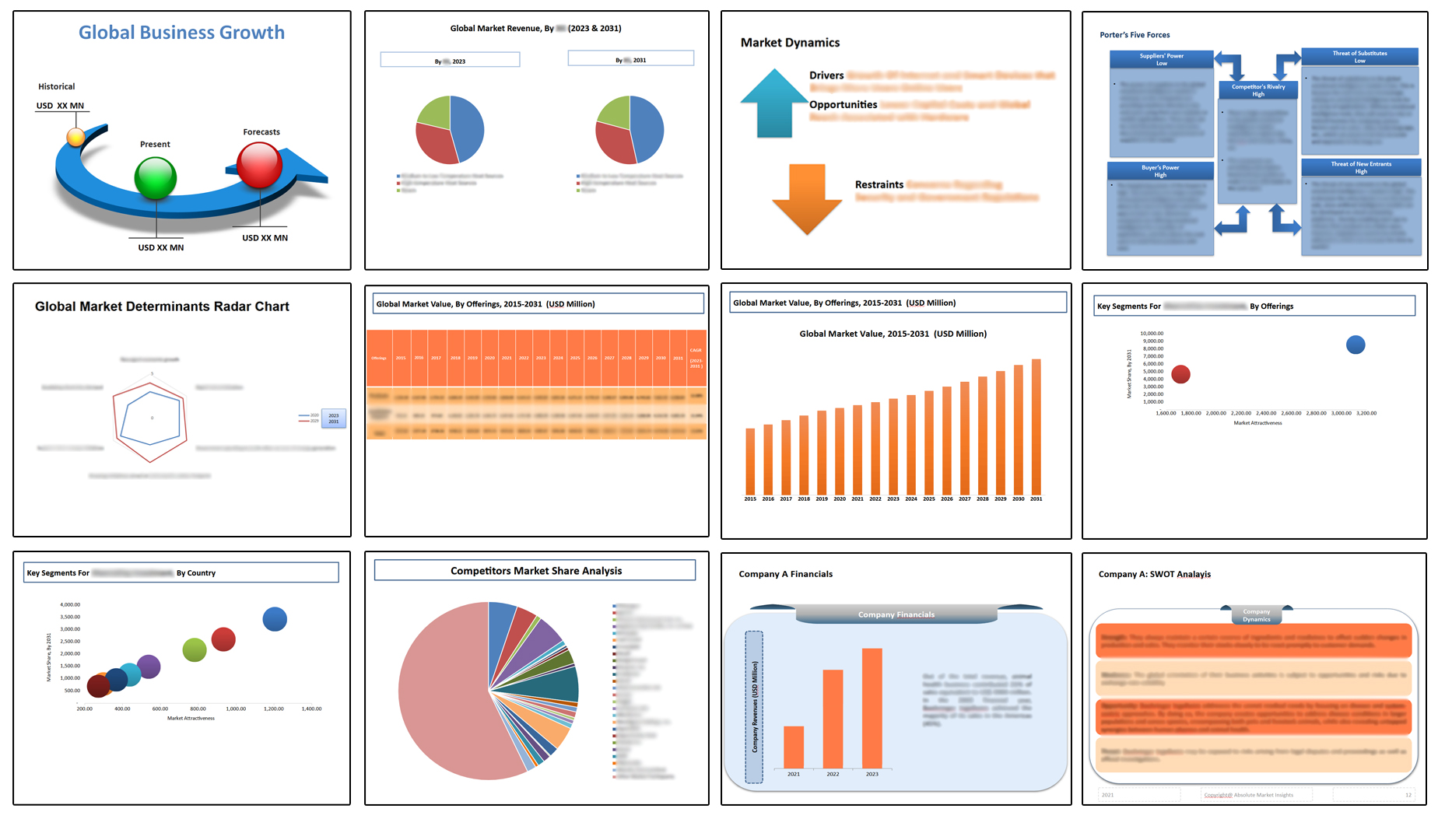
Table of Contents
Note: This ToC is tentative and can be changed according to the research study conducted during the course of report completion.
**Exclusive for Multi-User and Enterprise User.
Global Medical Equipment Maintenance Market
By Equipment
- Imaging Equipment
- CT
- MRI
- Digital X-Ray
- Ultrasound
- Others
- Life Support Devices
- Dental Equipment
- Electromedical Equipment
- Endoscopic Devices
- Surgical Instruments
- Other Medical Equipment
By Service
- Preventive Maintenance
- Corrective Maintenance
- Operational Maintenance
By Service Provider
- Multi-Vendor OEMs
- Single-Vendor OEMs
- Independent Service Organization
- In-House Maintenance
By Contract Type
- Basic Contract
- Premium Contract
- Customized Contract
- Add-On Contract
By End User
- Hospitals
- Diagnostic Imaging Centers
- Dialysis Centers
- Ambulatory Surgical Centers
- Dental Clinics & Specialty Clinics
- Other End Users
By Region
- North America (U.S., Canada, Mexico, Rest of North America)
- Europe (France, The UK, Spain, Germany, Italy, Nordic Countries (Denmark, Finland, Iceland, Sweden, Norway), Benelux Union (Belgium, The Netherlands, Luxembourg), Rest of Europe)
- Asia Pacific (China, Japan, India, New Zealand, Australia, South Korea, Southeast Asia (Indonesia, Thailand, Malaysia, Singapore, Rest of Southeast Asia), Rest of Asia Pacific)
- Middle East & Africa (Saudi Arabia, UAE, Egypt, Kuwait, South Africa, Rest of Middle East & Africa)
- Latin America (Brazil, Argentina, Rest of Latin America)
The Niche Research approach encompasses both primary and secondary research methods to provide comprehensive insights. While primary research is the cornerstone of our studies, we also incorporate secondary research sources such as company annual reports, premium industry databases, press releases, industry journals, and white papers.
Within our primary research, we actively engage with various industry stakeholders, conducting paid interviews and surveys. Our meticulous analysis extends to every market participant in major countries, allowing us to thoroughly examine their portfolios, calculate market shares, and segment revenues.
Our data collection primarily focuses on individual countries within our research scope, enabling us to estimate regional market sizes. Typically, we employ a bottom-up approach, meticulously tracking trends in different countries. We analyze growth drivers, constraints, technological innovations, and opportunities for each country, ultimately arriving at regional figures.Our process begins by examining the growth prospects of each country. Building upon these insights, we project growth and trends for the entire region. Finally, we utilize our proprietary model to refine estimations and forecasts.
Our data validation standards are integral to ensuring the reliability and accuracy of our research findings. Here’s a breakdown of our data validation processes and the stakeholders we engage with during our primary research:
- Supply Side Analysis: We initiate a supply side analysis by directly contacting market participants, through telephonic interviews and questionnaires containing both open-ended and close-ended questions. We gather information on their portfolios, segment revenues, developments, and growth strategies.
- Demand Side Analysis: To gain insights into adoption trends and consumer preferences, we reach out to target customers and users (non-vendors). This information forms a vital part of the qualitative analysis section of our reports, covering market dynamics, adoption trends, consumer behavior, spending patterns, and other related aspects.
- Consultant Insights: We tap into the expertise of our partner consultants from around the world to obtain their unique viewpoints and perspectives. Their insights contribute to a well-rounded understanding of the markets under investigation.
- In-House Validation: To ensure data accuracy and reliability, we conduct cross-validation of data points and information through our in-house team of consultants and utilize advanced data modeling tools for thorough verification.
The forecasts we provide are based on a comprehensive assessment of various factors, including:
- Market Trends and Past Performance (Last Five Years): We accurately analyze market trends and performance data from preceding five years to identify historical patterns and understand the market’s evolution.
- Historical Performance and Growth of Market Participants: We assess the historical performance and growth trajectories of key market participants. This analysis provides insights into the competitive landscape and individual company strategies.
- Market Determinants Impact Analysis (Next Eight Years): We conduct a rigorous analysis of the factors that are projected to influence the market over the next eight years. This includes assessing both internal and external determinants that can shape market dynamics.
- Drivers and Challenges for the Forecast Period:Identify the factors expected to drive market growth during the forecast period, as well as the challenges that the industry may face. This analysis aids in deriving an accurate growth rate projection.
- New Acquisitions, Collaborations, or Partnerships: We keep a close watch on any new acquisitions, collaborations, or partnerships within the industry. These developments can have a significant impact on market dynamics and competitiveness.
- Macro and Micro Factors Analysis:A thorough examination of both macro-level factors (e.g., economic trends, regulatory changes) and micro-level factors (e.g., technological advancements, consumer preferences) that may influence the market during the forecast period.
- End-User Sentiment Analysis: To understand the market from the end-user perspective, we conduct sentiment analysis. This involves assessing the sentiment, preferences, and feedback of the end-users, which can provide valuable insights into market trends.
- Perspective of Primary Participants: Insights gathered directly from primary research participants play a crucial role in shaping our forecasts. Their perspectives and experiences provide valuable qualitative data.
- Year-on-Year Growth Trend: We utilize a year-on-year growth trend based on historical market growth and expected future trends. This helps in formulating our growth projections, aligning them with the market’s historical performance.
Research process adopted by TNR involves multiple stages, including data collection, validation, quality checks, and presentation. It’s crucial that the data and information we provide add value to your existing market understanding and expertise. We have also established partnerships with business consulting, research, and survey organizations across regions and globally to collaborate on regional analysis and data validation, ensuring the highest level of accuracy and reliability in our reports.









